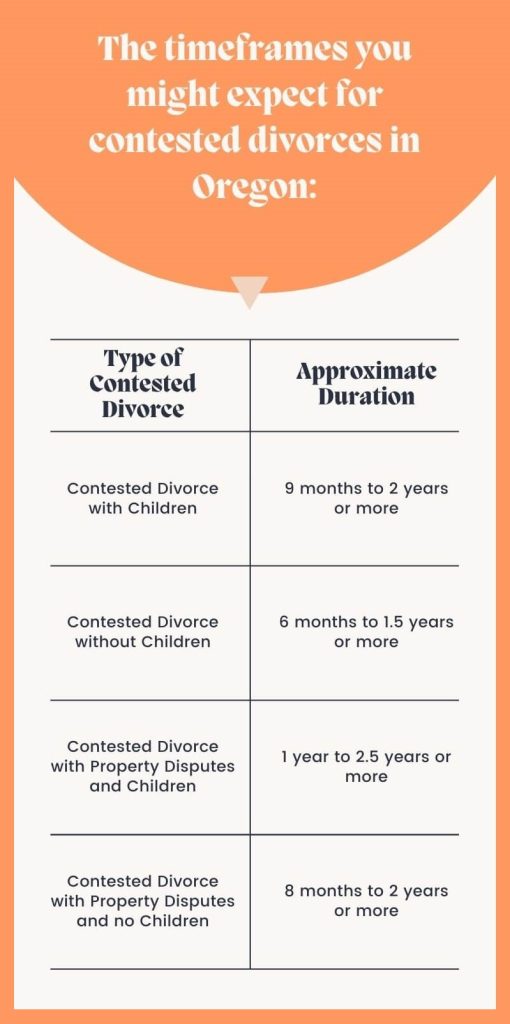Divorce is often an extremely painful event in a person’s life. In addition to the emotional toll to deal with, there are also many legal aspects of the process spouses should consider to obtain a final decision that will suit their interests. If you wonder, “What are my rights in a divorce in Oregon?”, this article is worth reading.
Table of Contents
ToggleIf you are planning to file for a marriage dissolution without a lawyer, it is paramount to know the basics of divorce law in Oregon. The information below will help you go through this process quickly and without extra stress.
Is Oregon a No-Fault Divorce State?
Oregon is a no-fault divorce state, meaning a couple does not need to allege any wrongdoing as a ground for their divorce when filing. If you want to initiate a divorce process in Oregon, it is enough to claim that the marriage was irretrievably broken due to marital disputes that make it impossible for you and your spouse to get along and reconcile.
The Grounds for Divorce in Oregon
Since you can initiate only an Oregon no-fault divorce, the only ground you can file upon and specify in your petition is called “irreconcilable differences.” It means the marital relationship cannot continue due to differences and conflicts between spouses. As for the fault-based grounds for divorce in Oregon, they are currently absent in the state.
Fault-Based Grounds
As of 2024, the Oregon courts have removed all the fault-based grounds for divorce. It allows couples to get a faster and less stressful marriage dissolution since neither party blames the other one for the fact that the marriage is over, and there is no need to prove this fault in court.
Residency Requirements for Divorce in Oregon

To obtain a divorce in Oregon, meeting the residency requirements of the state is a must for a person who initiates this process, a petitioner, or the second spouse, a respondent. According to Oregon residency laws, either spouse must live in the state for at least 180 days before filing. This condition must be complied with for a court to have jurisdiction over your case.
How to File for Divorce in Oregon
If you consider getting a divorce in Oregon without attorney’s assistance, you need to make sure you know how to proceed. An uncontested divorce in Oregon has the following steps to complete:
- Check if you qualify for this kind of divorce. Apart from meeting residency requirements, you must also ensure you can file without a lawyer’s involvement. It is only possible if you have no disputes with your spouse. If you agree on child custody and support, the division of property, alimony, etc., you can proceed without an attorney and seek an uncontested marriage dissolution.
- Prepare the paperwork. When filing without a lawyer, you will need to search for the forms required in your case and fill them out on your own. It is very important to complete each form properly, without any mistakes and inaccuracies in the information provided. The court may reject your paperwork if some forms are missing, outdated, or include incorrect data.
- File the papers. After you have prepared the papers, you must file them with the court. You will find more information about this step in the next paragraphs.
- Serve your spouse. After you file your documents, you must provide your spouse with copies so that they are aware that the divorce case has been opened. In Oregon, you are allowed to serve the papers on your own. However, the respondent must sign the Acceptance of Service, a form that you will have to file with the court. Alternatively, a county sheriff or a private process server can deliver the forms to your spouse. Please note that you will have to pay the fee for their service. Finally, you may also ask a third party over 18 years to give the paperwork to the respondent. If you choose any of these two options, you will have to provide a Certificate of Service to the court.
- Wait until the judge finalizes your divorce. If you have reached a full agreement with your spouse and your paperwork is in order, you may not be required to be present at the final hearing. The judge will review all the papers and sign the General Judgment of Dissolution of Marriage if they find the decisions you made with your spouse reasonable. After that, your divorce will be considered finalized.
What Is the First Step in Divorce in Oregon?
The first step you must take to start a divorce is to provide the court with the Petition for Dissolution of Marriage and other required Oregon divorce paperwork. Your Petition is an official request to the court to end your marriage. In this form, you must specify all the general information about you and your spouse, your kids, the date of your marriage, etc.

Where to File Your Divorce Case?
You must file your paperwork with the circuit court in the county where you or your spouse resides. Please note that you must make 2 copies of each form you have filled out before providing them to the court. You will have to submit the forms to the court clerk and pay the mandatory filing fee.

The Filing Fees for Divorce in Oregon
The filing fee in Oregon is approximately $400. If you cannot cover these costs, you can ask the court to defer or waive them. You must file two forms: Application for Deferral or Waiver of Fees & Declaration in Support and Order Regarding Deferral or Waiver of Fees. Please note that this option is only available to low-income families, and you will need to include information about your income and the governmental benefits you receive, if any, to prove to the court that you are in a financial struggle.
The judge will review the forms and decide whether to approve your request by deferring or waiving the fees or deny it.
- If the court defers the costs, you will have to pay them later according to a specific plan. However, please note that some additional administrative costs can be added in this case.
- If the fees are waived, you won’t have to pay anything.
- If your waiver request is rejected, make sure to cover the court fees within the date stated in the final order; otherwise, they will be considered a state debt.
How Much Does It Cost to Get Divorced in Oregon?

In general, the cost of divorce in Oregon depends on its type. If spouses are unable to come to an agreement about their divorce conditions, the costs will be adding up really quickly. The average price of a contested marriage dissolution starts from $11,000 and can exceed $15,000.
Such a huge price is explained by the fact that you will need to hire a lawyer who will defend your interests during the trial and potentially involve other experts to testify. These can be real estate appraisers, child custody evaluators, etc. Overall, the more complicated your case, the more expensive it becomes.
If you and your spouse are ready to work towards obtaining an amicable divorce, then the expenses can be reduced considerably. If you still prefer to work with a lawyer, expect to pay around $5,000 for your case.
However, the good news is that you can file completely on your own and save thousands of dollars. If you complete all the steps without any assistance, all you need to pay are the filing fees, which can also be waived if you qualify.
Nevertheless, taking into account the complexity of the paperwork preparation step, many couples choose to order their papers from an online divorce service. Such a company provides all the forms for your case so that you only sign and file them with the court. This service usually costs under $150, and many companies have a flat fee with no hidden expenses.
How Long Does a Divorce Take in Oregon?
On average, divorce can take from a few weeks to several months. Oregon used to have a 90-day waiting period for a divorce, which prolonged the timelines, but the state has recently repealed this law. Nowadays, if your case is uncontested and you prepare the paperwork properly so that the court accepts it, your divorce can be granted in a few weeks. In this case, the court workload is the main decisive factor in the duration of your divorce process.
However, if the divorce is contested, the timelines can be extended considerably, reaching four months on average if you can resolve disputes with your spouse relatively quickly. In complex cases with many disputes to resolve, for example, if you have children and disagree with your spouse on custody, your divorce case may take more than a year.

Is Oregon a Community Property State
No, Oregon is not a community property state. The state courts make their decisions on property division based on the equitable distribution principle. If the property was acquired only by one spouse during the marriage, it may be considered their own asset.
On the contrary, states that adhere to the community property principle regard any property acquired during the marriage as belonging to both spouses; therefore, it should be divided 50/50.
In Oregon, judges consider various factors when dividing the property to make sure that the distribution is fair. Moreover, even if you seek an uncontested divorce and agree with your spouse on who gets a house or other property or assets, the court will need to check if your agreement is fair to both parties.
How to Split up Assets During a Divorce in Oregon?

All the marital assets are split according to the equitable distribution principle. When making a decision, a judge usually takes into account such factors as each party’s contribution to the marriage, medical expenses, tax repercussions, etc.
Also, please note that gifts each party got are considered a separate asset and will not be subject to a division no matter when they were presented, during the marriage or before it.
Finally, remember that debts are also divided between spouses during a divorce. It is important to note that the judge can order to pay only those financial obligations that were acquired during the marriage, not before it. They also take into account who actually went into debt. As a result, you may be ordered to pay less than your spouse if it is primarily their financial obligation.
How to Divide Property After Divorce?
According to Oregon marital property laws, the property of each spouse, though acquired during a marriage, is not considered community property. The courts review each case individually and make decisions on the property division, taking into consideration how much each party contributed to acquiring property, their age and health, the retirement plans of each party, etc.
Moreover, even if one of the parties does not work, the court may still recognize their contribution to maintaining the household, bringing up children, etc. Finally, please note that the Oregon court does not consider a spousal fault when dividing property.
What Is a Spouse Entitled to in a Divorce in Oregon?
According to Oregon laws, each spouse is entitled to a fair share of property and assets. Besides, the spouse who requires financial support can get alimony if a couple agrees to it or the court makes such an order. Finally, the spouse who obtains physical custody of children can receive child support from the second parent.
How to Manage Child Support and Alimony Under Oregon Divorce Laws?

Oregon spousal support is usually awarded after the property division is performed. If, after the division, one of the spouses is unable to maintain a previous lifestyle, the second party, who is in a more favorable financial situation, can help them out.
However, a spouse may seek alimony no matter how many assets or property they get. In this case, the alimony can be awarded in such situations:
- To help the spouse to get back to work.
- As reimbursement for the spouses’ contribution to the career success of the second party.
- To maintain a previous standard of life.
When granting a decision, the court takes into account the following factors:
- For how many years spouses were married.
- Age and health state of the couple.
- The standards of living.
- Income of each spouse.
- Child’s needs.
In Oregon, the parent who has visitation rights must pay support to the parent who gets physical custody even if they both obtain joint custody rights. The amount is calculated based on the income of both spouses and how much each of them spends on their child. The spouses can estimate the amount in the state child support calculator.
The Bottom Line
Going through a divorce, contested or uncontested, is always hard since you need to start a completely new period of your life, which may be pretty challenging. However, the good news is that getting a smooth and easy divorce in Oregon online is not a myth if you know the basics of the divorce laws and the steps you must take. If you do not want to hire a lawyer but need help with paperwork preparation and your case is uncontested, turning to online services that complete divorce forms can be a reasonable solution to speed up the first steps of your marriage termination.


Natalie Martinez is a distinguished author with a profound expertise in family law. Her literary journey spans over a decade, during which she has penned several influential books dealing with the complexities of divorce-related legal matters. Recognized for her invaluable insights, Natalie’s work has garnered acclaim from renowned legal publications. She has been a featured guest on podcasts and webinars, sharing her profound knowledge and passion for family law.



